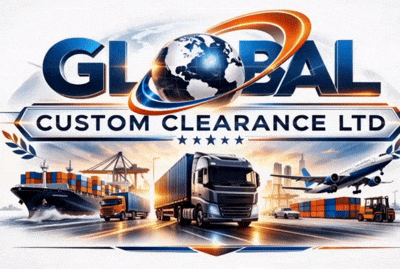Customs Clearance United Kingdom: A Complete Guide for Importers and Exporters

In the fast-paced world of global trade, customs clearance is the gateway between smooth international operations and frustrating delays. For anyone involved in importing or exporting goods to and from the United Kingdom, understanding the customs clearance process is essential. Since the UK’s departure from the European Union, regulations have tightened and procedures have become more complex, making customs clearance services even more crucial.
In this blog, we provide a detailed guide to customs clearance United Kingdom, discussing its importance, process, documentation, and how businesses can benefit from partnering with experienced customs clearance agents.
What is Customs Clearance?
Customs clearance refers to the process by which goods are approved by the government to enter or leave a country. It involves verifying that shipments comply with all applicable laws, paying any duties and taxes, and submitting the required documentation. In the UK, this process is overseen by HM Revenue & Customs (HMRC).
The goal of customs clearance is twofold:
- Protect national borders from illegal or dangerous goods.
- Collect customs duties and VAT, ensuring fair trade and tax compliance.
Why Customs Clearance is Crucial in the UK
The United Kingdom, as an island nation and a major global trading hub, has strict regulations governing the movement of goods. Since Brexit, even trade with the EU requires customs clearance, unlike the previous free movement of goods under the EU customs union.
Here’s why customs clearance is vital for your UK-bound or UK-originating goods:
- Avoid legal penalties for non-compliance
- Prevent shipment delays that can disrupt supply chains
- Ensure accurate duty and VAT payments
- Meet trade agreements and import/export regulations
Whether you’re a small business sending products abroad or a large corporation importing industrial equipment, customs clearance is non-negotiable.
How the Customs Clearance Process Works in the UK
Let’s break down the UK customs clearance process step by step:
1. Prepare the Necessary Documents
Accurate documentation is the foundation of a successful customs process. You typically need:
- Commercial Invoice
- Packing List
- Bill of Lading (sea freight) or Air Waybill (air freight)
- Import/export licenses (if applicable)
- EORI Number (Economic Operators Registration and Identification)
- Customs Declaration (via CHIEF or CDS)
2. Submit Customs Declarations
Once the documents are ready, the next step is to electronically submit your customs declaration through CDS or CHIEF. This involves declaring the type of goods, their origin, value, and intended use.
3. Pay Duties and Taxes
Customs will assess your shipment and apply any applicable:
- Customs duties
- Value Added Tax (VAT)
- Excise duties (if relevant, e.g., for alcohol or tobacco)
4. Goods Inspection (if required)
HMRC may decide to inspect your goods. This can be a random inspection or triggered by discrepancies in documentation or suspicion of non-compliance.
5. Release of Goods
After successful verification and payment, HMRC clears the goods. They are then released for delivery to the final destination.
Key Terms You Must Know
If you’re new to international trade, here are some essential customs-related terms:
- EORI Number: Required for businesses trading outside the UK. It identifies traders to HMRC.
- HS Code (Harmonized System): Classification code that determines customs duties.
- Incoterms: International commercial terms defining buyer-seller responsibilities.
- CPC (Customs Procedure Code): Indicates the customs regime for the goods.
Common Challenges with Customs Clearance
Despite being a standard process, many businesses struggle with customs clearance due to:
- Incorrect paperwork
- Misclassification of goods
- Lack of understanding of Incoterms
- Late duty payments
- Changing regulations post-Brexit
Such errors can lead to serious delays, financial penalties, and loss of reputation. Therefore, relying on professional customs clearance agents in the UK can save time and ensure compliance.
Benefits of Hiring a Customs Clearance Agent in the UK
A customs clearance agent (also called a customs broker) is a licensed professional who handles the customs process on behalf of traders. Partnering with one brings many advantages:
1. Expert Knowledge of UK Customs Law
Agents understand the latest UK import/export rules, tariff classifications, and VAT regulations—reducing your risk of errors.
2. Speedy Clearance Process
They can file electronic declarations swiftly and handle any follow-up questions from HMRC without delay.
3. Tailored Advice and Support
From commodity codes to trade agreements, customs agents provide personalized advice to optimize your shipping processes.
4. Reduced Costs
Agents can help you apply for customs relief schemes like Inward Processing Relief (IPR), Customs Warehousing, or simplified declarations, which reduce costs.
5. Peace of Mind
With a trusted partner handling your customs documentation and declarations, you can focus on your core business.
Top UK Ports and Airports for Customs Clearance
Customs clearance occurs at major UK points of entry, including:
- Ports: Felixstowe, Southampton, London Gateway, Dover, Liverpool
- Airports: Heathrow, Gatwick, Manchester, Stansted, Birmingham
Different ports may have slightly different processing times and requirements, depending on the type of goods and trade volume.
Digital Shift: CDS Replacing CHIEF
One of the most important changes in UK customs clearance is the shift from the CHIEF system to the Customs Declaration Service (CDS). Traders must now register for CDS and use it for:
- Submitting declarations
- Viewing VAT and duty payments
- Managing customs account information
This digital upgrade is part of the UK’s strategy to modernize its border infrastructure and streamline trade operations.
Tips for Smooth Customs Clearance in the United Kingdom
Here are practical tips to make sure your shipments don’t face unnecessary delays:
- Double-check documentation for errors or missing fields.
- Use correct HS codes and declare goods honestly.
- Track your shipments regularly and respond to customs queries promptly.
- Apply for an EORI number well in advance.
- Work with experienced freight forwarders and clearance agents.
Conclusion: Navigate UK Trade Smoothly with Professional Customs Clearance
The landscape of customs clearance United Kingdom is both vital and complex. With post-Brexit regulations, increased documentation, and technological transitions like CDS, navigating customs without expert help can be challenging.
Whether you’re a startup exploring international markets or an established importer/exporter, professional customs clearance support is the key to seamless, lawful, and efficient trade. Don’t let paperwork, regulations, or missteps derail your business. Instead, partner with a reliable customs agent and focus on growing your global reach.



